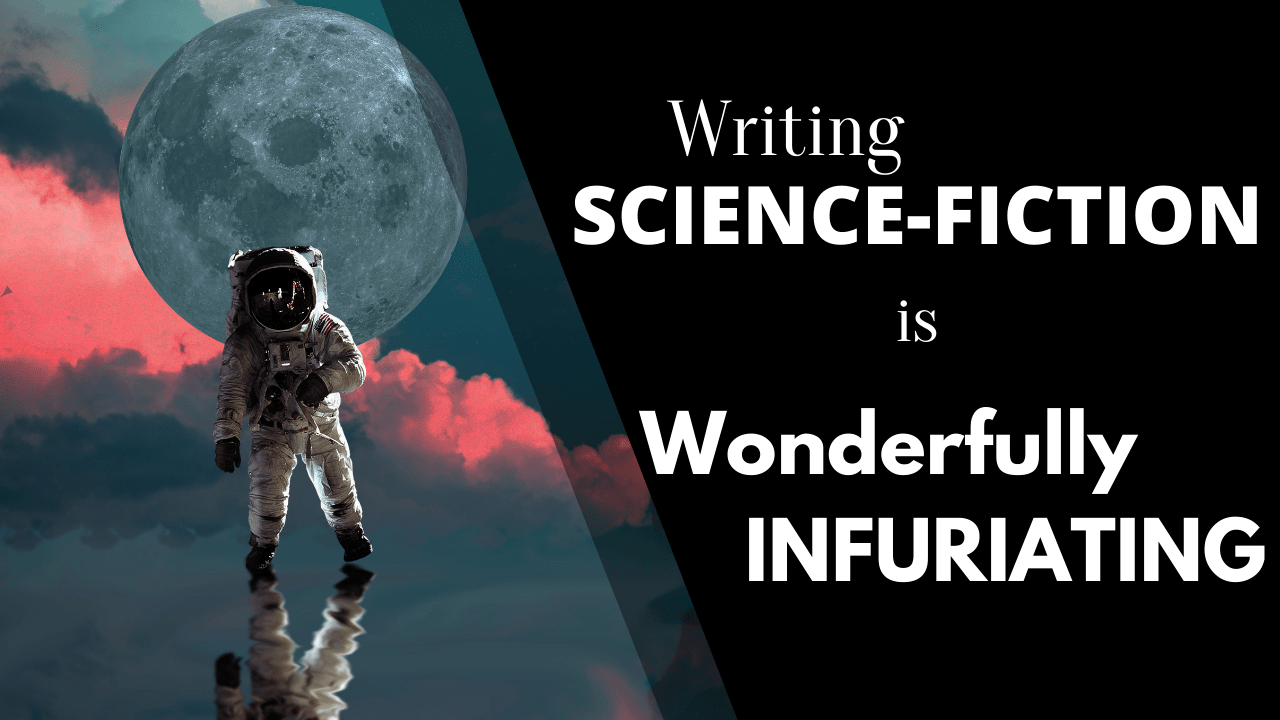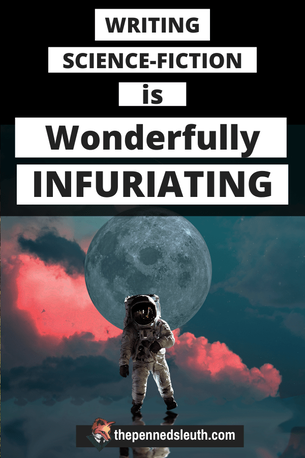Latest Writing Video! |
|
I haven’t written a science-fiction novel. I’ve dabbled with short stories quite a bit, exploring different story ideas, different themes. Some were comedic, some were adventures, some were thrillers. Yet, whenever I find the right amount of inspiration to turn an idea into a novel, I find the experience wonderful, then infuriating, and then I write a short story instead. Pin for Later!Worse still, I know where I am going wrong. The dream of travelling through space in my space ship, having the awe-inspiring view of planets and stars, knowing that the vacuum of space was right outside my door, has stuck with me since I was young and silly. Aliens, incredible technology and adventure literally in every direction, what’s not to love? I’ve grown up. I understand space a lot better, I understand physics a lot better. These facts sit in my mind, like a foreign entity, because I firmly refuse to let such facts spoil the dream of space for me. I still imagine myself on that spaceship, trading valuable resources with aliens, doing my part for the galactic economy. When I sit down to write a short story, ideas appear before me much like the racks of guns that appeared before Neo in the Matrix. I had stories, a lot of stories. Yet, when it comes to writing a science fiction novel, I fail within the first five chapters. My problem is simple. I don’t disconnect myself from the story enough to be a writer. I, despite all my efforts, place myself so firmly within my characters shoes, that their personality warps, their decisions change and soon my story is in tatters because I know better than the character I am writing. I plot such a journey for my protagonists. Yet, when it comes time for me to write the inciting incident, the one that kickstarts the story, I stop. I want the character to answer that fake distress signal, to go to the aid of that ship, only to find space pirates and their dangerous cargo. I want them to discover the truth, to be captured, to show horror as the cargo takes out the pirates. I want them to escape and several years later, be asked to defeat this horror for the good of the galaxy. I want them to sacrifice themselves, not for the galaxy, but for their friends and the one they love. Instead, I get carried away with my desire to be in their shoes that I take control. I realise what I am doing, I realise I spoiled the plot, and very soon abandon the novel, choosing to write a short story. Now, this is a problem to be sure and an extreme version. Many writers face this. Perhaps not to the extent they replace their main character, but certainly they ruin their story by using what they know as the writer to tip off the character and they do this unknowingly. Every character makes a decision based on a reason and it is a reason they come up with on their own. Yet, it is very easy to overlook this in some cases. It’s much like when you’re watching a horror movie, some slasher flick from the 70s or 80s. The protagonist hears a noise outside, in the middle of the night, coming from the shed, which is at the edge of the creepy forest. You watch this idiot, unable to tear your eyes away, as they unlock the door to their home, walk defenceless towards the shed. The protagonist reaches for the doorknob and all hell breaks loose. Everyone watching this is wondering why they aren’t still in their home, with their shotgun in one hand and the other holding the phone as they call the police. Quite simply, the story needs to go someplace, so the writer influences the character’s decisions instead of building up to it. It would be a lot scarier if the protagonist tried calling the police, but the phone stops working. To arm themselves with a kitchen knife when they hear the ominous noise outside their front door. To have danger come to them, instead of them looking for danger. But I digress. Often, we all write unconsciously. The story simply flows, we write instinctively, and while we write everything seems logical. That’s why it is easy to write something the comes off either amateurish or out of character. It’s a great sign really, it simply means the writer is so passionate about their theme or story they found themselves caught up in it. Sometimes in a small way, sometimes in a tremendously foolish way, like me. I love writing science-fiction and someday I will succeed in writing a full novel. Until then, the genre will remain wonderfully infuriating. On that note… Good day, goodnight and happy writing! Thank YouAs a big thank you for reading this article I would like to offer you something for FREE!
Start your 3-Day training course that will help you improve your book with EASE! Claim your free training here! Thank you for reading! Kind regards Matthew Dewey, Writer
0 Comments
Leave a Reply. |







